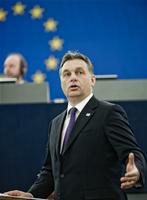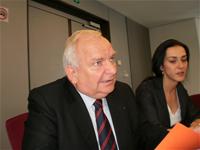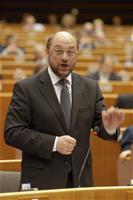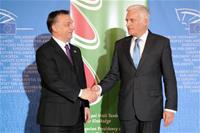Truth is not always on majority's side
Ralitsa Kovacheva, January 22, 2011
 Hungarian Prime Minister Viktor Orban had a difficult first meeting with MEPs. They criticised the Hungarian media law which, among other controversial legislative changes, caused some international media to talk about "putinization" of Hungary. The most colourful were the representatives of the Greens/EFA Group, who protested by putting sticky tape on their mouths and by carrying posters with the word "Censored".
Hungarian Prime Minister Viktor Orban had a difficult first meeting with MEPs. They criticised the Hungarian media law which, among other controversial legislative changes, caused some international media to talk about "putinization" of Hungary. The most colourful were the representatives of the Greens/EFA Group, who protested by putting sticky tape on their mouths and by carrying posters with the word "Censored".
Viktor Orban, who presented the Hungarian EU Presidency's priorities, began his speech by reminding that it was the Hungarians who first cracked the communist regime and stood with arms against the Soviet occupiers: “We were the first ones to knock a brick out of the wall of Communism and it collapsed” , Orban said. He stressed that while fighting communism, the Hungarians had done much for Europe's unification and promised that the Hungarian Presidency would work in the 1956's spirit.
Orban, however, explicitly warned the lawmakers: "Whatever you think about  domestic politics in Hungary, do not confuse criticism for it with the Hungarian presidency. If you mix the two topics, I'm ready to fight." In conclusion, Orban confirmed that Hungary was ready to change the media law, if the European Commission requested so. The Commission is currently reviewing the law and according to President Jose Manuel Barroso, it will require from the Hungarian authorities some clarifications on issues of concern.
domestic politics in Hungary, do not confuse criticism for it with the Hungarian presidency. If you mix the two topics, I'm ready to fight." In conclusion, Orban confirmed that Hungary was ready to change the media law, if the European Commission requested so. The Commission is currently reviewing the law and according to President Jose Manuel Barroso, it will require from the Hungarian authorities some clarifications on issues of concern.
Two days earlier, at an extraordinary meeting of the European Parliament's Civil Liberties, Justice and Home Affairs Committee, Digital Agenda Commissioner Neelie Kroes briefed the MEPs on the progress of the Commission's examination of the Hungarian Media Law. According to Commissioner Kroes, the Hungarian law may be in breach of the EU Audiovisual and Media Services (AVMS) Directive, because its provisions will apply to firms from other countries, which would be in violation of the “country of origin” principle. According to it, media service providers are a subject to regulation only in their countries of origin.
Another problem is that “the provision of the law on the need to ensure balanced information extends from the area of broadcasting, where such rules are quite common, to on-demand audiovisual media services, including for example a simple video blogger.” The lack of clarity on this requirement and the lack of limiting criteria may lead to “over-reach and a problem of proportionality in the regulation of media freedom”, Ms Kroes said. The same lack of limiting criteria may cause an over-extensive application of rules on media registration. The Commission is still silent on the “difficult issue of criteria for media authority independence”.
 Though there are still no results from the examination, MEPs did not spare criticism to the Hungarian prime minister. Most lenient, understandably, was the European People's Party Group - Orban's party Fidesz is an EPP member. The president of the largest group in the EP, Joseph Daul, noted that Fidesz considered freedom and democracy as its core values, and voiced confidence that Orban would fulfill his promise, if needed, to change the law. "We have known each other for long and I know that you will work in the spirit of the European treaties, because you are a convinced European!”, Mr Daul said.
Though there are still no results from the examination, MEPs did not spare criticism to the Hungarian prime minister. Most lenient, understandably, was the European People's Party Group - Orban's party Fidesz is an EPP member. The president of the largest group in the EP, Joseph Daul, noted that Fidesz considered freedom and democracy as its core values, and voiced confidence that Orban would fulfill his promise, if needed, to change the law. "We have known each other for long and I know that you will work in the spirit of the European treaties, because you are a convinced European!”, Mr Daul said.
The leader of the Progressive Alliance of Socialists and Democrats, Martin Schulz,  disagreed with Orban that the media law was an internal affair of Hungary. This is a European debate, because the law is in violation of European principles, Schultz said giving an example with the media regulator, dominated by representatives of the ruling party. Media should control the power, not the power - the media, as it is according to your law, Schulz claimed. He advised Orban not to wait for the results of the Commission’s examination and have the law changed. Schulz certainly did not fail to accuse the Commission that was delaying too much its analysis.
disagreed with Orban that the media law was an internal affair of Hungary. This is a European debate, because the law is in violation of European principles, Schultz said giving an example with the media regulator, dominated by representatives of the ruling party. Media should control the power, not the power - the media, as it is according to your law, Schulz claimed. He advised Orban not to wait for the results of the Commission’s examination and have the law changed. Schulz certainly did not fail to accuse the Commission that was delaying too much its analysis.
The leader of the ALDE Group (Alliance of Liberals and Democrats for Europe), Guy Verhofstadt also urged Orban to use his two thirds- majority to change the law as quickly as possible. “The aim of media governance is not to guarantee 'proper' and 'adequate' information. The aim is to uphold pluralism and to guarantee that any initiative in media can be developed”, the former Belgian prime minister said.
 As usual, one of the most colourful speeches was that of the co-leader of the Greens/EFA Group Daniel Cohn-Bendit. He warned Orban, that he was “on the path of becoming a European Chavez, a national populist”. There is no such thing as balanced information, Cohn-Bendit said and asked rhetorically: “Do you think Mr Nixon got balanced information? Or Mr Bush on Abu Ghraib? Do you think Mr Berlusconi thinks research done on his life amounts to balanced information?" This law does not correspond with EU's values and if we accept it, how would we talk to Mr Lukashenko or China, the leader of the Greens/EFA stated with indignation.
As usual, one of the most colourful speeches was that of the co-leader of the Greens/EFA Group Daniel Cohn-Bendit. He warned Orban, that he was “on the path of becoming a European Chavez, a national populist”. There is no such thing as balanced information, Cohn-Bendit said and asked rhetorically: “Do you think Mr Nixon got balanced information? Or Mr Bush on Abu Ghraib? Do you think Mr Berlusconi thinks research done on his life amounts to balanced information?" This law does not correspond with EU's values and if we accept it, how would we talk to Mr Lukashenko or China, the leader of the Greens/EFA stated with indignation.
In response to MEPs' attacks, Viktor Orban commented that they were misled in many respects and gave an example with the lack of sanctions for unbalanced information in the media law. It is curious, however, that in an interview for Der Spiegel magazine, a Hungarian journalist refuted this claim. Károly Vörös, editor in chief of the Hungarian daily Népszabadság, explained that, although the law came into effect at the beginning of the year, the media council was not allowed to impose penalties until July 1. That means that the pressure on media will be strengthened after the end of the Hungarian presidency of the EU and this was done deliberately by the government to avoid external criticism.
According to Viktor Orban, Hungary's media law is not contrary to the European  values and is no less democratic than the German media law. The Hungarian Prime Minister defined the criticism as an insult to his people, which provoked stormy reactions in the hall and new accusations of populism. "Contrary to many opinions, expressed here, the rule of low in Hungary is currently recovering”, Orban concluded.
values and is no less democratic than the German media law. The Hungarian Prime Minister defined the criticism as an insult to his people, which provoked stormy reactions in the hall and new accusations of populism. "Contrary to many opinions, expressed here, the rule of low in Hungary is currently recovering”, Orban concluded.
It is curious that a similar argument is often highlighted also by the Bulgarian government, and the parallels Borisov-Orban are more frequent on different issues. The whole debate in the European parliament was interesting from a Bulgarian point of view because such issues are so relevant in our country too, as well as doubts regarding the sharing of the fundamental European values by the government. And as for Hungary, an impressive phrase of Daniel Cohn-Bendit applies for Bulgaria: “There are moments in history when you shouldn`t cross a certain line. In a democracy, the truth is not always on the side of the majority.”